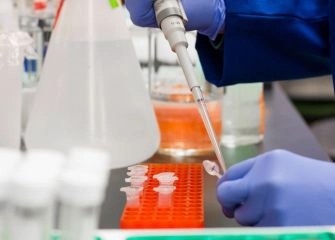Faculty Affiliate Program Connects Researchers and Policymakers Across Disciplines
Jennifer Dunn, Marco Gallio, and Robert Weinstock share how their research has been shaped by the interdisciplinary network of Faculty Affiliates
 New multidisciplinary research in sustainability and energy will soon be underway, with more than $460,000 in seed funding and $720,000 in lab instrumentation equipment funding awarded to Northwestern University faculty from the Paula M. Trienens Institute for Sustainability and Energy. In addition, $517,000 was awarded for University technology commercialization and demonstration projects. This first round of funding from the Trienens Institute was available to faculty affiliates who applied by the September 1 deadline, and was awarded across schools and disciplines.
New multidisciplinary research in sustainability and energy will soon be underway, with more than $460,000 in seed funding and $720,000 in lab instrumentation equipment funding awarded to Northwestern University faculty from the Paula M. Trienens Institute for Sustainability and Energy. In addition, $517,000 was awarded for University technology commercialization and demonstration projects. This first round of funding from the Trienens Institute was available to faculty affiliates who applied by the September 1 deadline, and was awarded across schools and disciplines.
“The number and quality of funding applications we received is a testament to the need for this vital funding, as well as the talent within Northwestern,” remarked Michael R. Wasielewski, co-executive director of the Trienens Institute. He noted that the number of submitted proposals heavily outweighed available funding. Applications were carefully evaluated by a committee of Northwestern faculty members representing numerous academic disciplines. " The Trienens Institute is thrilled to be able to offer funding to 10 principal investigators for their exciting, interdisciplinary initiatives through our seed funding program, which was revitalized by the generous grant from the Howard and Paula Trienens Fund this past June,” he said. “We are also delighted to move a wide array of research and education initiatives forward with our funded equipment awards,” he shared.
Seed funding facilitates new directions of faculty research that target emerging areas in sustainability and energy. The ability to develop, test, and refine new research hypotheses allows researchers to generate the initial data and partnerships needed to secure additional funding and resources from federal agencies and other sponsors for long-term impact. Commercialization funding allows for focused collaboration through the Office for Research with the Innovation and New Ventures Office (INVO), which will provide a natural “next step” as faculty look at options for translational impact and commercialization of research findings. Demonstration project funding will support research projects to scale translational solutions for resilient communities impacts.
Principal Investigator |
Co-Investigator(s) |
Project Title |
Funding Type |
| Ludmilla Aristilde, civil and environmental engineering | Probing bacterial platforms with natural metabolic versatility for processing plastics derivatives | Seed | |
| Julia Behrman, sociology | Climate change, school attendance and learning in sub-saharan Africa | Seed | |
| Marco Gallio, neurobiology | Alessia Para, neurobiology; Yarrow Axford, Earth and planetary sciences | Looking into the past to anticipate the future: using ancient DNA from arctic lakes to uncover genomic changes that predict vulnerability of insect communities to ongoing climate change | Seed (with two years of spending awarded) |
| Bryan Hunter, chemistry | Nanostructured Mg-doped tetrahedrites for reversible CO2 capture | Seed | |
| Niall Mangan, engineering sciences and applied mathematics | Linsey Seitz, chemical and biological engineering | Enabling sustainable chemistry through multi-scale experimental and modeling analyses of electrocatalytic reactors | Seed |
| Justin Notestein, chemical and biological engineering | Quantifying core elements in a material using inductively coupled plasma - optical emission spectroscopy (ICP-OES) | Seed | |
| Andrew Jacobson, Earth and planetary sciences | Bradley Sageman and Patrick Giavelli, Earth and planetary sciences; Nyree Zerega and Louise Egerton-Warburton, plant biology and conservation | Experimental and numerical development of protocols for enhanced rock weathering: verifying carbon capture criteria and biological impacts | Demonstration Project, (two years awarded) |
| Bradley Sageman, Earth and planetary sciences | Andrew Jacobson, Earth and planetary sciences; Nyree Zerega and Louise Egerton-Warburton, plant biology and conservation | Acquisition of a portable x-ray fluorescence (XRF) spectrometer for soil and plant analyses | Lab Instrumentation (in conjunction with Demonstration Project above) |
| Dane Swearer, chemistry | Sossina Haile, materials science and engineering | Electrifying commodity chemical production with engineered plasma-surface interactions | Seed (capital purchase included) |
| Aaron Packman, civil and environmental engineering | William Miller, chemical and biological engineering | Utilities support for CROCUS climate instrumentation on Scott Hall roof | Lab Instrumentation |
| Neil Schweitzer, chemical and biological engineering | Justin Notestein, chemical and biological engineering | Vapourtec robotic, modular flow chemistry system | Lab Instrumentation |
| Cecile Chazot, materials science | Ryan Truby, materials science; Nathan Gianneschi, chemistry | Biopolymer characterization through ionic liquid-based gel permeation chromatography | Lab Instrumentation |
| William Dichtel, chemistry | UV/vis/NIR spectrophotometer for PFAS destruction and low energy separations | Lab Instrumentation | |
| Justin Notestein, chemical and biological engineering | Quantifying core elements in a material using inductively coupled plasma - optical emission spectroscopy (ICP-OES) | Lab Instrumentation | |
| Magdalena Osburn, Earth and planetary sciences | Yarrow Axford, and Bradley Stevenson, Earth and planetary sciences; Goerge Wells, civil and environmental engineering; Amy Rosenzweig, molecular biosciences | Towards the measurement of trace greenhouse gas isotopes: purchase of a trace gas pre-concentration device for multidisciplinary C cycle research at NU | Lab Instrumentation |
| John Torkelson, chemical and biological engineering | Collaboration with Innovation and New Ventures (INVO) | Incubation Funding | |
| Mark Hersam, materials science and engineering | Collaboration with Innovation and New Ventures (INVO) | Incubation Funding |
The next review of proposals will take place following the March 1, 2024 proposal submission deadline. The application portal is already open for submissions from faculty affiliates. Interested faculty may learn more about becoming an affiliate here.